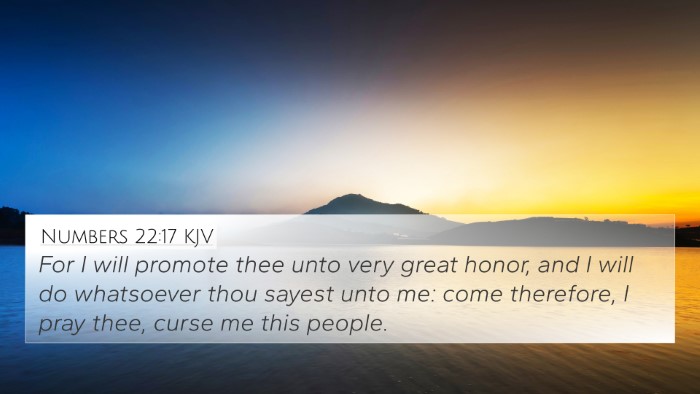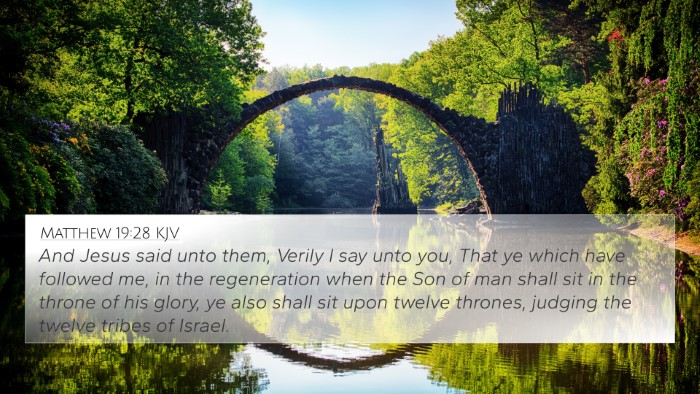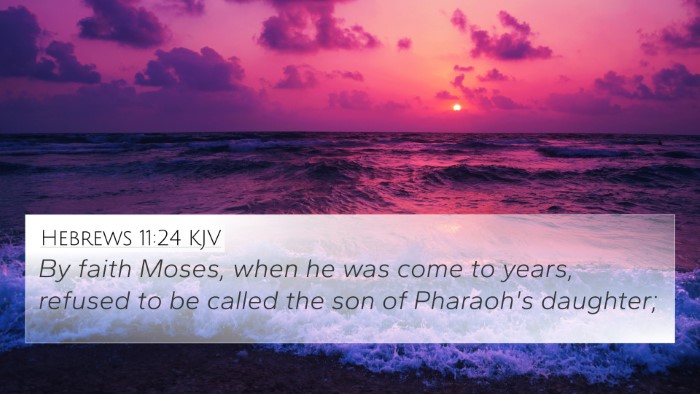Understanding Numbers 24:11
Numbers 24:11 states, "Therefore now flee thou to thy place: I thought to promote thee unto great honor; but, lo, the Lord hath kept thee back from honor." This verse is a powerful statement regarding the futility of opposing God's will and illustrates the theme of divine sovereignty over human intentions.
Summary of Biblical Meaning
In this passage, we find Balaam, a prophet, responding to the king of Moab, Balak, who sought to have him curse Israel. The verse highlights the conflict between human ambition and divine purpose. Balaam had initially intended to respond favorably to Balak’s request, believing he could gain honor and profit. However, God intervenes, preventing him from achieving this goal.
Theological Insights
Matthew Henry's commentary notes the importance of recognizing God's authority in decisions that seem to offer personal gain. He emphasizes that God’s plans will prevail over human desires. Albert Barnes points out that Balaam's situation reminds us that God’s will often clashes with human expectations, leading to divine restraint of action that may seem beneficial but is ultimately against His will.
Adam Clarke elaborates on this by discussing the contrast between Balaam's aspirations for personal glory and God’s overarching purpose for Israel. Clarke argues that even if Balaam wanted to comply, God’s command renders it impossible for him to fulfill Balak’s desires, showing that God protects His people from any harmful intention.
Cross-References for Deeper Understanding
This verse can be connected with various biblical texts, enhancing our understanding of the theme of divine will versus human action. Here are some key Bible verse cross-references:
- Proverbs 16:9: "A man's heart deviseth his way: but the Lord directeth his steps." - This illustrates the same principle that human plans may be established, but it is God who ultimately guides.
- Isaiah 46:10: "Declaring the end from the beginning, and from ancient times the things that are not yet done..." - This verse emphasizes God’s control over future events.
- James 4:13-15: "Go to now, ye that say, To day or tomorrow we will go into such a city, and continue there a year, and buy and sell, and get gain..." - This teaches about the uncertainty of life outside of God’s will.
- Jeremiah 10:23: "O Lord, I know that the way of man is not in himself: it is not in man that walketh to direct his steps." - A reminder of human limitations in determining one's path.
- Proverbs 21:30: "There is no wisdom nor understanding nor counsel against the Lord." - This verse reinforces the folly of standing against God’s plans.
- Romans 8:28: "And we know that all things work together for good to them that love God..." - A promise that even human setbacks align with God’s greater purpose.
- Psalms 33:10-11: "The Lord bringeth the counsel of the heathen to naught: he maketh the devices of the people of none effect." - A statement about God’s sovereignty over worldly plans.
Comparative Bible Verse Analysis
The connections between Bible verses reveal deep insights into God's character and His governance over creation. Understanding these themes through a comparative analysis helps in grasping how different parts of the Bible contribute to a unified message on the nature of divine intervention. This inter-Biblical dialogue guides believers in contextually interpreting scripture.
Thematic Connections
Exploring thematic Bible verse connections sheds light on how Numbers 24:11 relates to similar struggles throughout scripture, such as:
- Genesis 50:20: Joseph’s acknowledgment of God’s intention amidst what was meant for evil.
- Exodus 7:1: God making Moses a god to Pharaoh while utilizing human authority.
- 1 Samuel 16:7: God's focus on the heart, contrasting human judgment.
Tools for Bible Cross-Referencing
Understanding how to link scripture through tools for Bible cross-referencing can greatly enhance one’s study. Resources like a Bible concordance or a Bible cross-reference guide can provide guidance to help uncover these connections.
Conclusion
As we reflect on Numbers 24:11, we are reminded of the complexities of human desires confronted by divine purpose. This verse, along with its cross-references, invites believers to trust in God's ultimate plan, recognizing that earthly ambitions may often pale in comparison to His sovereign will.










